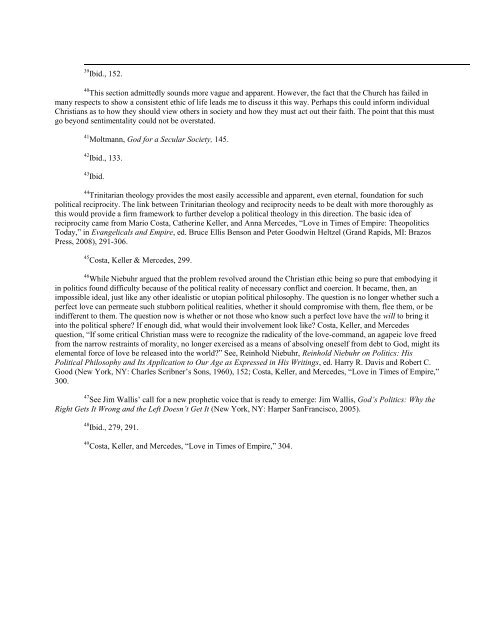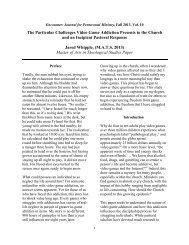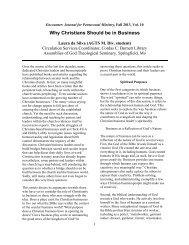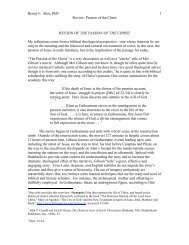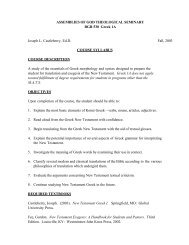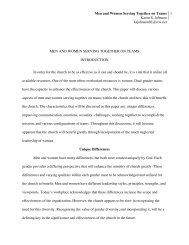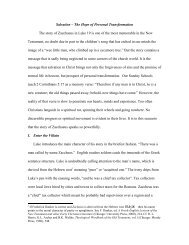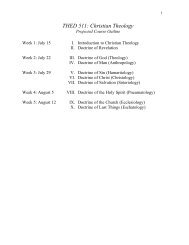Encounter: Journal for Pentecostal Ministry - Assemblies of God ...
Encounter: Journal for Pentecostal Ministry - Assemblies of God ...
Encounter: Journal for Pentecostal Ministry - Assemblies of God ...
You also want an ePaper? Increase the reach of your titles
YUMPU automatically turns print PDFs into web optimized ePapers that Google loves.
39 Ibid., 152.<br />
40 This section admittedly sounds more vague and apparent. However, the fact that the Church has failed in<br />
many respects to show a consistent ethic <strong>of</strong> life leads me to discuss it this way. Perhaps this could in<strong>for</strong>m individual<br />
Christians as to how they should view others in society and how they must act out their faith. The point that this must<br />
go beyond sentimentality could not be overstated.<br />
41 Moltmann, <strong>God</strong> <strong>for</strong> a Secular Society, 145.<br />
42 Ibid., 133.<br />
43 Ibid.<br />
44 Trinitarian theology provides the most easily accessible and apparent, even eternal, foundation <strong>for</strong> such<br />
political reciprocity. The link between Trinitarian theology and reciprocity needs to be dealt with more thoroughly as<br />
this would provide a firm framework to further develop a political theology in this direction. The basic idea <strong>of</strong><br />
reciprocity came from Mario Costa, Catherine Keller, and Anna Mercedes, “Love in Times <strong>of</strong> Empire: Theopolitics<br />
Today,” in Evangelicals and Empire, ed. Bruce Ellis Benson and Peter Goodwin Heltzel (Grand Rapids, MI: Brazos<br />
Press, 2008), 291-306.<br />
45 Costa, Keller & Mercedes, 299.<br />
46 While Niebuhr argued that the problem revolved around the Christian ethic being so pure that embodying it<br />
in politics found difficulty because <strong>of</strong> the political reality <strong>of</strong> necessary conflict and coercion. It became, then, an<br />
impossible ideal, just like any other idealistic or utopian political philosophy. The question is no longer whether such a<br />
perfect love can permeate such stubborn political realities, whether it should compromise with them, flee them, or be<br />
indifferent to them. The question now is whether or not those who know such a perfect love have the will to bring it<br />
into the political sphere? If enough did, what would their involvement look like? Costa, Keller, and Mercedes<br />
question, “If some critical Christian mass were to recognize the radicality <strong>of</strong> the love-command, an agapeic love freed<br />
from the narrow restraints <strong>of</strong> morality, no longer exercised as a means <strong>of</strong> absolving oneself from debt to <strong>God</strong>, might its<br />
elemental <strong>for</strong>ce <strong>of</strong> love be released into the world?” See, Reinhold Niebuhr, Reinhold Niebuhr on Politics: His<br />
Political Philosophy and Its Application to Our Age as Expressed in His Writings, ed. Harry R. Davis and Robert C.<br />
Good (New York, NY: Charles Scribner‟s Sons, 1960), 152; Costa, Keller, and Mercedes, “Love in Times <strong>of</strong> Empire,”<br />
300.<br />
47 See Jim Wallis‟ call <strong>for</strong> a new prophetic voice that is ready to emerge: Jim Wallis, <strong>God</strong>’s Politics: Why the<br />
Right Gets It Wrong and the Left Doesn’t Get It (New York, NY: Harper SanFrancisco, 2005).<br />
48 Ibid., 279, 291.<br />
49 Costa, Keller, and Mercedes, “Love in Times <strong>of</strong> Empire,” 304.


